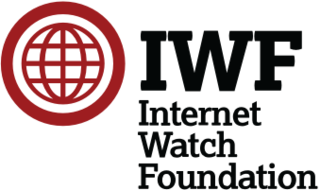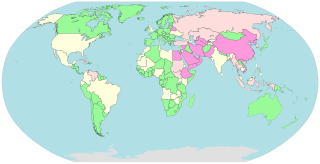Related Research Articles
An Internet filter is software that restricts or controls the content an Internet user is capable to access, especially when utilized to restrict material delivered over the Internet via the Web, Email, or other means. Content-control software determines what content will be available or be blocked.

The European Union Agency for Law Enforcement Cooperation, better known under the name Europol, formerly the European Police Office and Europol Drugs Unit, is the law enforcement agency of the European Union (EU) formed in 1998 to handle criminal intelligence and combat serious international organised crime and terrorism through cooperation between competent authorities of EU member states. The Agency has no executive powers, and its officials are not entitled to arrest suspects or act without prior approval from competent authorities in the member states. Seated in The Hague, it had 1,432 staff members in 2022.
The Australian Communications and Media Authority (ACMA) is an Australian government statutory authority within the Communications portfolio. ACMA was formed on 1 July 2005 with the merger of the Australian Broadcasting Authority and the Australian Communications Authority.
Internet censorship in Australia is enforced by both the country's criminal law as well as voluntarily enacted by internet service providers. The Australian Communications and Media Authority (ACMA) has the power to enforce content restrictions on Internet content hosted within Australia, and maintain a blocklist of overseas websites which is then provided for use in filtering software. The restrictions focus primarily on child pornography, sexual violence, and other illegal activities, compiled as a result of a consumer complaints process.
The International Centre for Missing & Exploited Children (ICMEC), headquartered in Alexandria, Virginia, with a regional presence in Brazil, Singapore, and Australia, is a private 501(c)(3) non-governmental, nonprofit global organization. It combats child sexual exploitation, child pornography, and child abduction.
Before the era of internet business in Indonesia, internet connections could only be found at a few leading universities. By using UUCP, university servers in Indonesia exchange information with other university servers in the world through their respective gateways. In 1994, the internet business in Indonesia was started, marked by the granting of an internet service provider (ISP) company license issued by the Indonesian government to PT. Rahajasa Media Internet or RADNET.
Internet censorship in the United Kingdom is conducted under a variety of laws, judicial processes, administrative regulations and voluntary arrangements. It is achieved by blocking access to sites as well as the use of laws that criminalise publication or possession of certain types of material. These include English defamation law, the Copyright law of the United Kingdom, regulations against incitement to terrorism and child pornography.

Internet in the Czech Republic and Internet access are largely provided by the private sector and is available in a variety of forms, using a variety of technologies, at a wide range of speeds and costs. In 2013, 68% of Czechs were connected to the Internet.
Internet in Tajikistan became present within the country during the early 1990s. Tajikistan had just become independent in 1992, with Emomali Rahmon as the new ruler, when the internet was introduced to the country. Nevertheless, it was after over a decade that the country’s internet became more accessible. The history of the internet’s foundation in Tajikistan extends from 1992 to present-day Tajikistan. By 2009, internet penetration had developed since the initial conception of the internet in Tajikistan and Internet Service Providers (ISPs) had increased in number. In terms of the ISPs, Tajikistan primarily relied upon satellite-based connections using Discovery Global Networks.

The Internet Watch Foundation (IWF) is a registered charity based in Cambridge, England. It states that its remit is "to minimise the availability of online sexual abuse content, specifically child sexual abuse images and videos hosted anywhere in the world and non-photographic child sexual abuse images hosted in the UK." Content inciting racial hatred was removed from the IWF's remit after a police website was set up for the purpose in April 2011. The IWF used to also take reports of criminally obscene adult content hosted in the UK. This was removed from the IWF's remit in 2017. As part of its function, the IWF says that it will "supply partners with an accurate and current URL list to enable blocking of child sexual abuse content". It has "an excellent and responsive national Hotline reporting service" for receiving reports from the public. In addition to receiving referrals from the public, its agents also proactively search the open web and deep web to identify child sexual abuse images and videos. It can then ask service providers to take down the websites containing the images or to block them if they fall outside UK jurisdiction.
Internet censorship in New Zealand refers to the Government of New Zealand's system for filtering website traffic to prevent Internet users from accessing certain selected sites and material. While there are many types of objectionable content under New Zealand law, the filter specifically targets content depicting the sexual abuse or exploitation of children and young persons. The Department of Internal Affairs runs the filtering system, dubbed the Digital Child Exploitation Filtering System (DCEFS). It is voluntary for Internet Service Providers (ISPs) to join.
Child pornography is pornography that unlawfully exploits children for sexual stimulation. It may be produced with the direct involvement or sexual assault of a child or it may be simulated child pornography. Abuse of the child occurs during the sexual acts or lascivious exhibitions of genitals or pubic areas which are recorded in the production of child pornography. Child pornography may use a variety of mediums, including writings, magazines, photos, sculpture, drawing, painting, animation, sound recording, video, and video games. Child pornography may be created for profit or other reasons.

Pornography in Pakistan is subject to several legal provisions. The Government of Pakistan has placed ban on internet websites containing such material since November 2011. Major pornography website are already barred in Pakistan. In 2016, it was reported that government of Pakistan ordered Internet Service Providers (ISPs) in Pakistan to block more than 400,000 websites which contained pornographic content. Later in 2019, around 800,000 additional website containing pornographic content were banned by the Pakistan Telecom Authority on the order of government of Pakistan.
The precise number of websites blocked in the United Kingdom is unknown. Blocking techniques vary from one Internet service provider (ISP) to another with some sites or specific URLs blocked by some ISPs and not others. Websites and services are blocked using a combination of data feeds from private content-control technology companies, government agencies, NGOs, court orders in conjunction with the service administrators who may or may not have the power to unblock, additionally block, appeal or recategorise blocked content.
The child abuse image content URL list is a list of URLs and image hashes provided by the Internet Watch Foundation to its partners to enable the blocking of child pornography & criminally obscene adult content in the UK and by major international technology companies.

Stop Child Abuse – Trace an Object is an online campaign by Europol that shows objects which appear in the background of child sexual abuse material footage. Europol asks people to visit this website and to look at the objects. The project seeks to identify objects and their locale in order to find and aid victims; situate crime scenes; and apprehend perpetrators. Europol believes that having many people trying to identify the objects will expedite the investigative process, allowing individual law enforcement agencies to identify perpetrators and victims of child abuse faster. Individuals may submit information about objects anonymously without further contact from Europol or other law enforcement agencies. Europol's Victim Identification Task Force established the Trace an Object website as part of an overall effort to curb abuse crimes and human trafficking.
Canadian Centre for Child Protection is a Canadian registered charitable organization dedicated to the personal safety of all children. More specifically, its goal is to reduce the victimization of children by providing programs and services to the Canadian public.

This list of Internet censorship and surveillance in Europe provides information on the types and levels of Internet censorship and surveillance that is occurring in countries in Europe.

This list of Internet censorship and surveillance in Oceania provides information on the types and levels of Internet censorship and surveillance that is occurring in countries in Oceania.

Cybersex trafficking, live streaming sexual abuse, webcam sex tourism/abuse or ICTs -facilitated sexual exploitation is a cybercrime involving sex trafficking and the live streaming of coerced sexual acts and/or rape on webcam.
References
- ↑ "PUBLIC" (PDF). Archived from the original (PDF) on 2012-12-09. Retrieved 2019-09-16.
- ↑ "EU2008.si - European Police Chiefs (EPCTF) for better operational cooperation between police forces". www.eu2008.si.
- ↑ "Digital Single Market". Digital Single Market.
- ↑ "EUROPOL, the European Police Office". Archived from the original on 2009-11-03. Retrieved 2009-06-05.
- ↑ "Archived copy" (PDF). Archived from the original (PDF) on 2011-05-14. Retrieved 2011-03-26.
{{cite web}}: CS1 maint: archived copy as title (link) - ↑ "Internet / Home - INTERPOL". www.interpol.int. Archived from the original on 2010-10-22.